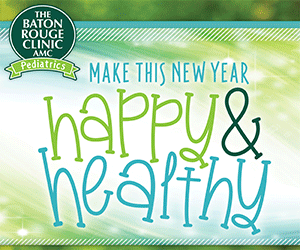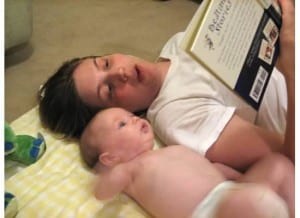May is “Better Speech & Hearing Month,” and as moms we know how valuable the gift of speech and hearing are. For the next few weeks, I will be sharing methods and tools to help foster good speech and language development in your child as they develop from baby to early childhood years. As a Speech and Language Pathologist, I will provide you with a series of posts that address developmental milestones, activities to enhance your child’s speech and what to expect if you feel like your child might not be reaching their milestones.
Speech and language milestones are a set of skills that are achieved within a specific time frame. These skills are divided into receptive and expressive language skills. Receptive skills refer to the understanding, comprehension, and interpretation of language. Expressive skills refer to the use of language to express your wants and needs.
It is important to remember that each child develops differently. These milestones are a guideline range and are not a definitive time frame. Some children hit each range to a tee and others might be on the later end throughout their development. Some kids meet motor milestones early and linguistic later and vise versa. My biggest advice is look at your child as an individual and as a whole. Try not to compare to siblings, classmates and other relatives. Yes, I know it’s difficult, but each child is unique and has their own set of strengths and weaknesses. That being said, specific things should not be overlooked. It is very important to attend well visits and consult your Dr. immediately if any concerns arise. Early intervention is the key to addressing these concerns and resolving them quickly and/or identifying any other potential issues.
For this first week, I will begin with infants ages 6-12 months and discuss their milestones and tools you can use to aid in their development.
What you can do to enhance your baby’s development at this age:
- Stay on top of ear infections and hearing tests- If your baby has recurring ear infections and/or fluid, it can affect your baby’s hearing. Hearing with chronic fluid makes it sound as if you are hearing under water.
- Reinforce your baby’s communication attempts by looking at him or her, speaking, and imitating his or her vocalizations.
- Repeat his or her laughter and facial expressions.
- Teach your baby to imitate actions. Peekaboo, clapping, blowing kisses, pat-a-cake, itsy-bitsy spider, and waving bye-bye all teach turn-taking that is necessary for conversation.
- Teach animal sounds because these are made up of consonants that are the building blocks of language.
- Maintain joint attention. Joint attention is when you and your baby are attending to same object. This way you are not describing ball in the book when you child is looking at the cat.



















